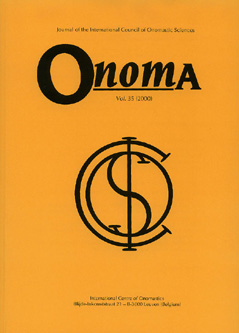 previous article in this issue previous article in this issue | next article in this issue  |

Preview first page |
Document Details : Title: Naming in Novelizing the Nation Subtitle: Intertextualities of Ellison, Vonnegut, and Kingston Author(s): VANDERSEE, Charles (†) Journal: Onoma Volume: 38 Date: 2003 Pages: 305-324 DOI: 10.2143/ONO.38.0.2002562 Abstract : Naming in Novelizing the Nation: Intertextualities of Ellison, Vonnegut, and Kingston The United States as a world-historical experiment has, not unexpectedly, produced an impressive series of writings that seek to define -and indeed name- the people and experiences involved? Twentieth-century novelists such as Ralph Ellison (Invisible Man), Kurt Vonnegut (Player Piano), and Maxine Hong Kingston (Tripmaster Monkey) vigorously make nomastic moves of perhaps unexpected complexity. Unlike Henry James, who regretted having little previous U.S. culture to draw on, these writers of nation-defining novels appropriate both real people (Whitman, Emerson) and a regnant myth (the protean man) when naming characters, in works whose chief mode is realism, despite elements of fantasy and strong stylization. When observing the recurrence of names and when digging into origins, the alert reader constructs layering and uncovers some complex intertextuality (the Proteus character of Vonnegut, for example, connects with Ellisinon's classical Proteus). L'attribution des noms de la novélisation d'une nation: l'intertextualité chez Ellison, Vonnegut, et Kingston Comme il fallait s'y attendre, le champ d'expérimentation unique de l'histoire mondiale que constituent les États-Unis a produit un ensemble impressionant d'écrits cherchant à définir -et donc à nommer- les peuples et les expériences concernées. les romanciers du XXe siècle, comme Ralph Ellison (Homme invisible pour qui chantes-tu?), Kurt Vonnegut (Le Pianiste déchaîné) ou Maxine Hong Kingston (Tripmaster Monkey) ont opéré des déplacements onomastiques vigoureux d'une complexité sans doute inattendue. À la différence de Henry James qui déplorait de ne pouvir se revêtir que d'une faible culture américaine préliminaire, ces auteurs de romans en quête d'identité nationale s'approprient aussi bien des êtres réels (Whitman, Emerson) que des mythes dominants (l'homme protéiforme) pour caractériser leurs personnages dans des œuvres fondamentalement réalistes en dépit d'éléments fantaisistes et d'une forte stylisation. En observant la récurrence des noms en tentant de chercher leur origine, le lecteur vigilant met à jour des strates et découvre une intertextualité complexe (le caractère protéiforme de Vonnegut, par exemple, rejoint la figure classique du Protée d'Ellison). Namengebung und Nationenbildung im Erzählprozess: Intertextualität bei Ellison, Vonnegut, und Kingston Die Vereinigten Staaten haben als ein welthistorisches Experiment -nicht unerwartet- eine eindrucksvolle Reihe von literarischen Werken hervorgebracht, die beabsichtigen, das Volk und damit verbundenen Erfahrungen zu definieren und diese -in der Tat- auch zu benennen. Romanciers des 20. Jahrhunderts wie Ralph Ellison ('Invisible Man'), Kurt Vonnegut ('Player Piano') und Maxine Hong Kingston ('Tripmaster Monkey') bestreiten beherzt onomastische Wege von möglicherweise unerwarteter Komplexität. Im Gegensatz zu Henry James, der bedauerte, sich auf nur wenig amerikanische Kultur stützen zu können, eignen sich die Autoren der identitätsstiftenden Romane sowohl reale Personen (Whitman, Emerson) als auch eine herrschenden Mythos (der proteische Mensch) an, wenn sie Charaktere in Werken benennen, in denen der Realismus trotz fantastischer Elemente und starker Stilisierung dominiert. Wenn der aufmerksame Leser die Wiedererscheinung der Namen beobachtet und die Ursprünge sucht, konstruiert er abgesunkene Schichten und deckt eine umfangreiche Intertxtualität auf (Dei Proteus-Figur bei Vonnegut hängt z.B. mit Ellisons klassischen Proteus zusammen). |
|


